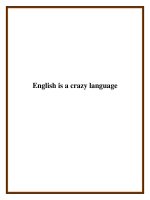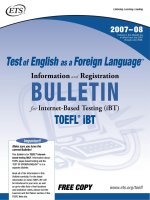English is a crazy language
Bạn đang xem bản rút gọn của tài liệu. Xem và tải ngay bản đầy đủ của tài liệu tại đây (170.16 KB, 3 trang )
<span class='text_page_counter'>(1)</span><div class='page_container' data-page=1>
English is a crazy language
<b>Bạn đã bao giờ thấy Egg trong Eggplant? hay Ham trong Hamburger? Và cịn rất nhiều nghịch lý</b>
<b>trong cách dùng ngơn ngữ của người Anh. Chúng ta hãy cùng tìm hiều những điều thú vị của tiếng</b>
<b>Anh trong bài này nhé!</b>
English is a crazy language. There is no <b>egg </b>in <b>eggplan</b>t nor <b>ham </b>in <b>hamburger</b>;
neither <b>apple</b> nor <b>pine</b>in <b>pineapple</b>. English muffins weren’t invented in England or
French fries in France. <b>Sweetmeats </b>are candies while <b>sweetbreads</b>, which aren’t
sweet, are meat.
<i>Eggplant: cà tím</i>
<i>Ham: cái búa</i>
<i>Pine: cây thông</i>
<i>Pineapple: dứa</i>
<i>Sweetmeat: đồ ngọt</i>
<i>Sweetbread: nội tạng bê, cừu dùng làm thức ăn (e.g: stomach sweetbread)</i>
We take English for granted. But if we explore its paradoxes, we find
that <b>quicksand</b> can work slowly,<b>boxing rings</b> are square and a <b>guinea pig</b> is neither
from Guinea nor is it a pig.
<i>Paradox: nghịch lý</i>
<i>Quicksand: vùng cát lún</i>
<i>Boxing ring: sàn đấu quyền anh</i>
<i>Guinea pig: chuột lang</i>
And why is it that writers write but fingers don’t fing, grocers don’t groce and
hammers don’t ham? If the plural of tooth is teeth, why isn’t the plural of booth
beeth? One goose, 2 geese. So one moose, 2 meese? One index,2 indices?
<i>Booth: phịng điện thoại cơng cộng</i>
<i>Moose: nai sừng tấm Bắc Mĩ</i>
Doesn’t it seem crazy that you can make <b>amends </b>but not one amend, that you
comb through <b>annals </b>of history but not a single annal? If you have a bunch of
odds and ends and get rid of all but one of them, what do you call it?
<i>amends: tiền bồi thường (luôn ở dạng số nhiều)</i>
<i>make amends: bồi thường</i>
<i>annals: biên niên sử </i>
If <b>teachers taught</b>, why didn’t <b>preacher praught</b>? If a <b>vegetarian </b>eats <b>vegetables</b>, what
does a<b>humanitarian </b>eat? If you wrote a letter, perhaps you bote your tongue?
<i>preacher: linh mục</i>
<i>Vegetarian: người ăn chay</i>
<i>Humanitarian: người theo chủ nghĩa nhân đạo</i>
Sometimes I think all the English speakers should be committed to an asylum for
the verbally insane. In what language do people <b>ship by truck</b> and <b>send cargo by</b>
<b>ship</b>? Have <b>noses</b> that <b>run</b> and <b>feet </b>that<b>smell</b>? <b>Park </b>on <b>driveways </b>and
drive on <b>parkways</b>?
<i>Asylum: nhà thương điên</i>
<i>Insane: điên cuồng, mất trí</i>
<i>Ship (đt): chở bằng tàu thủy; (dt) tàu thủy</i>
<i>Running nose: chảy nước mũi</i>
<i>Feet smell: chân có mùi</i>
<i>Park: đỗ xe</i>
</div>
<span class='text_page_counter'>(2)</span><div class='page_container' data-page=2>
How can a <b>slim chance</b> and a <b>fat chance</b> be the same, while a <b>wise man</b> and <b>wise</b>
<b>guy</b> are opposites? How can <b>overlook </b>and <b>oversee </b>be opposites, while quite a lot
and quite a few are alike? How can the weather be <b>hot as hell</b> one day and <b>cold</b>
<b>as hell</b> another.
<i>Slim chance = fat chance: có ít cơ hội</i>
<i>Wise man: người thông thái</i>
<i>Wise guy: kẻ hợm đời</i>
<i>Overlook: bỏ qua, tha thứ; trông nom, giám sát</i>
<i>Oversee: trông nom, giám thị</i>
Have you noticed that we talk about certain things only when they are absent?
Have you ever seen a<b>horseful carriage</b> or a <b>strapful gown</b>? Met a <b>sung hero</b> or
experienced <b>requited love</b>? Have you ever run into someone who
was <b>combobulated, gruntled, ruly or peccable</b>? And where are all those people who
ARE <b>spring chickens</b> or who would ACTUALLY <b>hurt a fly</b>?
<i>Những từ sau chỉ dùng ở dạng phủ định (có tiền tố hoặc hậu tốt phủ định): "Horseless carriage</i>
<i>(xe chạy bằng động cơ), strapless gown (đầm khơng có dây), unsung hero (anh hùng vơ danh),</i>
<i>unrequited love (tình đơn phương), discombobulated (bối rối, ngượng), disgruntled (khơng bằng</i>
<i>lịng, cáu kỉnh), unruly (ngỗ ngược, ngang ngạnh), impeccable (hoàn hảo). </i>
<i>Spring chicken: người trẻ tuổi</i>
You have to marvel at the unique lunacy of a language in which your house
can <b>burn up</b> as it <b>burns down</b>, in which you fill in a form by <b>filling it out</b> and in which
an alarm clock <b>goes off</b> by going on.
<i>Marvel: ngạc nhiên, lấy làm lạ</i>
<i>Lunacy: sự điên rồ, tình trạng điên rồ</i>
<i>Burn up = Burn down: bị cháy hoàn toàn</i>
<i>Fill the form out: điền thông tin vào mục</i>
<i>Alarm clock goes off: đồng hồ báo thức đổ chuông</i>
English was invented by people, not computers, and it reflects the creativity of
the human race (which, of course, isn’t a race at all). That is why, when the <b>stars</b>
<b>are out</b>, they are visible, but when the l<b>ights are out</b>, they are invisible. And why,
when I <b>wind up my watch</b>, I start it, but when I <b>wind up this essay</b>, I end it.
<i>the stars are out: ngôi sao biến mất </i>
<i>lights are out: điện bị tắt</i>
<i>visble: nhìn thấy được >< invisible: khơng nhìn thấy được</i>
<i>wind up the watch: lên cót cho đồng hồ</i>
</div>
<span class='text_page_counter'>(3)</span><div class='page_container' data-page=3></div>
<!--links-->
Tài liệu Test of English as a Foreign Language doc
- 36
- 869
- 0








